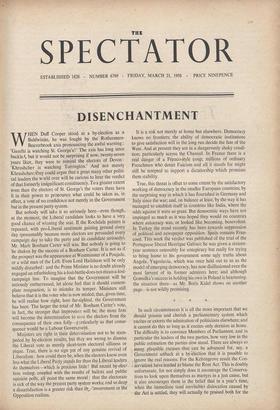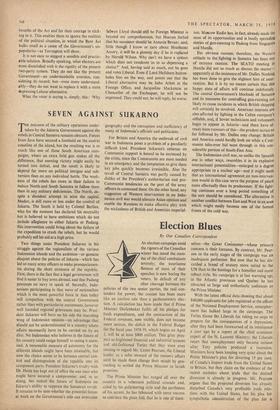DISENCHANTMENT
WHEN Duff Cooper stood at a by-election as a Baldwinite, he was fought by the Rothermere- Beaverbrook axis pronouncing the awful warning : `Gandhi is watching St. George's!' The axis has long since buckle t. but it would not be surprising if now, twenty-seven years Mum., they were to remind the electors of Devon : `Khrushchev is watching Torrington.' And not merely Khrushchev; 6ey could argue that'a great many other politi- cal leaders the warld over will be curious to hear the verdict of that formerly insignificant constituency. To a greater extent even than the electors of St. George's the voters there have it in their power to prWounce what could be taken as, in effect, a vote of no confideztze not merely in the Government but in the present party system.
But nobody will take it so seriously here—even though, at the moment, the Liberal candidate looks to have a very good chance of whining the seat. If the Rochdale pattern is repeated, with pro-Liberal sentiment gaining ground every day (presumably because more electors are persuaded every campaign day to take the party and its candidate seriously), Mr. Mark. Bonham Carter will win. But nobody is going to be shaken by the success of a Bonham Carter. It is not as if the prospect was the appearance at Westminster of a Poujade, or a wild man of the Left. Even Lord Hailsham will be only mildly disturbed : and the Prime Minister is no doubt already engaged on refurbishing his a-lost-battle-does-not-mean-a-lost- campaign line. To imagine that the Government will be seriously embarrassed, let alone feel that it should contem- plate resignation, is to mistake its temper. Ministers still believe that it is the voter who is now misled; that, given time, he will realise how right, how far-sighted, the Government has been.' The larger the total of Mr. Bonham Carter's vote, in fact, the stronger that impression will be; the more firm will become the determination to save the electors from the consequence of their own folly—particularly as that conse- quence would be a Labour Goverianent.
Ministers are right in their determination not to be stam- peded by by-election results; but they are wrong to dismiss the Liberal vote as merely short-term electoral silliness or pique. True, there is no sign yet of any genuine revival of Liberalism : how could there be, when the electors know even less what the Liberal Party stands for than the Liberal, leaders do themselves—which is precious little ! But recent by-elec- tion voting, coupled with the results' of ballots and public opinion polls, all point the same moral : that the electorate is sick of the way the present party system works; and so deep a dissatisfaction is a greater risk than th, , ,>'mvernment or the Opposition realises. It is a risk not merely at home but elsewhere. Democracy knows no, frontiers; the ability of democratic institutions to give satisfaction will in the long run decide the fate of the West. And at present they are in a dangerously shaky condi- tion; particularly across the Channel. In France there is a real danger of a Franco-tyle coup; millions of ordinary Frenchmen who detest Fascism and all it stands 'for might still be tempted to support a dictatorship which promises them stability.
True, this threat is offset to some extent by the satisfactory working of democracy in the smaller European countries; by the surprising way in which it has flourished in Germany and Italy since the war; and, on balance at least, by the way it has managed to establish itself in'countries like India, where the odds against it were so great. But democratic ways have not impinged as much as it was hoped they would on countries where autocracy was, or looked like becoming, benevolent. In Turkey the trend recently has been towards suppression of political and newspaper opposition. Spain remains Fran- coed. This week the verdict was published 'of the trial of the Portuguese liberal Henrique Galvao; he was given a sixteen- year sentence ostensibly for conspiracy but really for trying to, bring home to his government some ugly truths about Angola. Yugoslavia, which was once held out to us as the model of emerging democracy, has now disillusioned even the most fervent of its former admirers here; and although Gomulka's success in holding his own in Poland is heartening, the situation there—as Mr. Boris Kidel shows on another page—is not wildly promising.
In such circumstances it is all the more important that we should possess and cherish a parliamentary system which excites or extorts the admiration of politicians elsewhere; and it cannot do this so long as it excites only derision at home. The difficulty is to convince Members of Parliament, and in particular the leaders of the two parties, how very low in the public estimation the parties now stand. There are always so many plausible excuses that can be advanced for, say, a Government setback at a by-election that it is possible to ignore the real reasons. For the Kelvingrove result the Con- servatives have tended to blame the Rent Act. This is doubly unfortunate, for not simply does it encourage the Conserva- tives to look upon themselves as martyrs in a just cause, but it also encourages them in the belief that in a year's time, when the immediate (and inevitable) dislocation caused by the Act is settled, they will actually be praised both for the benefits of the Act and for their courage in stick- ing to it. This enables them to ignore the realities of the political situation, in which the Rent Act bulks small as a cause of the Government's un- popularity—as Torrington will show.
It is not easy to suggest a sensible and practic- able solution. Broadly speaking, what electors are most dissatisfied with is the rigidity of the present two-party system. They do not like the present Government—an understandable aversion, con- sidering its record; but—even more understand- ably—they do not want to replace it with a more depressing Labour alternative.
What the voter is saying is, simply, this : 'Why Selwyn Lloyd should still be Foreign Minister is beyond my comprehension, but Heaven forbid that his successor should be Aneurin Bevan: and, little though I know or care about Heathcoat Amory, it will be a gloomy day if he is replaced by Harold Wilson. Why can't we have a system which does not condemn us to so depressing a choice?' And, having said as much, out he goes and votes Liberal. Even if Lord Hailsham button- holes him on the way, and points out that the Liberal alternative may be John Arlott at the Foreign Office, and Jacqueline Mackenzie as Chancellor of the Exchequer, he will not be impressed. They could not, he will reply, be worse.



































 Previous page
Previous page